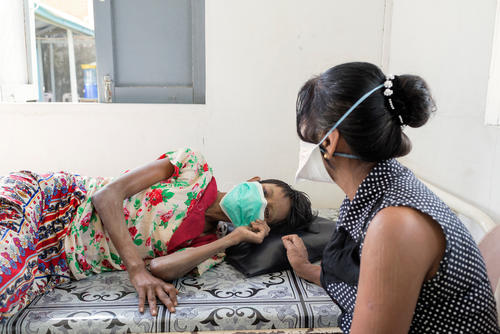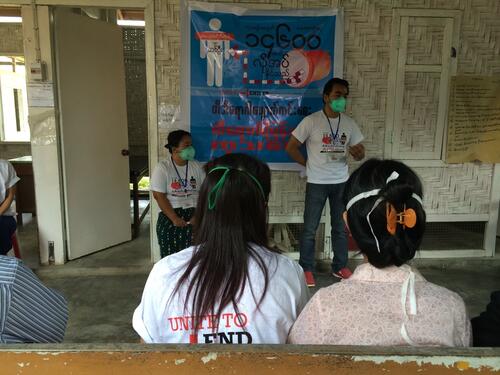
123,400
123,4
34,700
34,7
1,000
1,

300
3
Rakhine state
Results from six surveys MSF conducted in refugee settlements in Bangladesh revealed a grossly disproportionate response by the Myanmar military to attacks on police posts in August. At a conservative estimate, at least 6,700 Rohingya are believed to have been killed in Myanmar in a one-month period, including at least 730 children below the age of five. More than 660,000 people – mostly Rohingya – had fled to Bangladesh by the end of the year. When villages were burned to the ground, three of the four clinics run by MSF were destroyed. MSF operations in northern Rakhine were restricted between early August and the end of the year due to a ban on international staff and a lack of authorisation to carry out medical activities. MSF continued to reach out to the authorities to offer support in emergency and non-emergency healthcare for the people remaining in Rakhine. In September, MSF publicly called on the government of Myanmar to grant independent and unfettered access to international humanitarian organisations.
Until August, MSF provided primary and reproductive healthcare in fixed and mobile clinics in Maungdaw district and supported Ministry of Health and Sports hospitals in Maungdaw and Buthidaung with HIV care. MSF teams carried out over 36,000 medical consultations and 1,043 referrals. In and around Sittwe and Pauktaw, MSF offered primary and reproductive healthcare, and emergency referrals through mobile clinics deployed to villages and five camps for internally displaced people, with an average of 1,820 consultations per month in the camps.
By the end of the year, MSF was still waiting for permission to operate as Rohingya continued to flee across the border into Bangladesh. Very few humanitarian organisations were allowed access to Rakhine.

Shan and Kachin states
There was renewed conflict in Kachin and Shan states, where an estimated 100,000 people are displaced. MSF assists vulnerable communities there. In 2017, teams treated 16,586 people living with HIV and 504 patients with tuberculosis (TB), including 28 with multidrug-resistant TB (MDR-TB), across the two states.
Yangon region
In Yangon, MSF provided care to patients with HIV and TB at two clinics. The team started treatment for 21 patients with extensively drug-resistant TB. In addition, 42 HIV-positive patients received treatment for MDR-TB and 194 for hepatitis C.
Tanintharyi region
MSF continues to run a clinic in Dawei, supporting hospitals to decentralise HIV care. MSF is responsible for viral load testing for all HIV patients in Tanintharyi region, and works with the community to improve early HIV detection and treatment. Treatment for TB and hepatitis C is also available.
Wa and Naga
Due to a worsening political situation and the inability to secure access for MSF international staff, medical activities in Wa Special Region 2, northern Shan state, ended in mid-2017. Before closing, MSF conducted over 2,430 outpatient consultations through fixed and mobile clinics. A new programme focusing on primary healthcare and health promotion was launched in Naga, one of the most remote corners of the country, in Sagaing region.


















